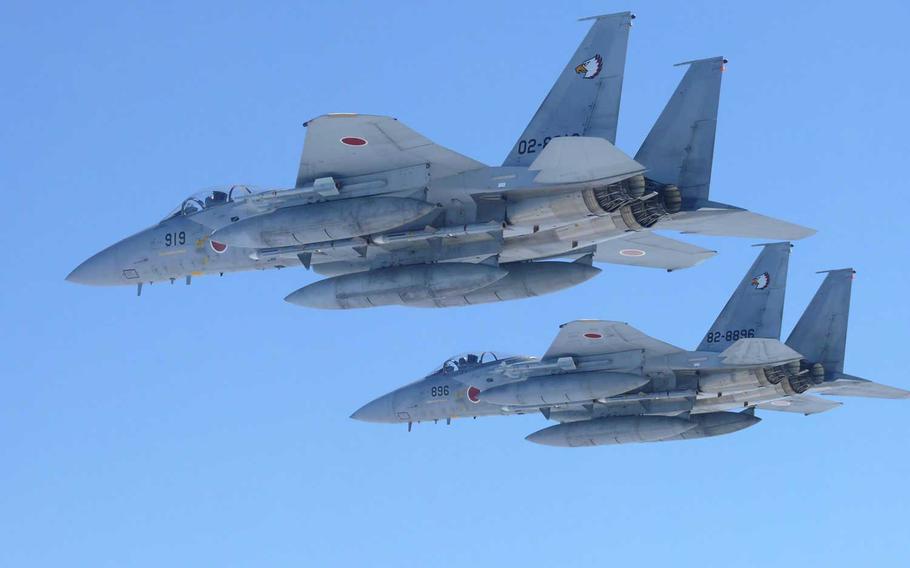
Money to upgrade F-15 fighters of the Japan Air Self-Defense Force, like those seen here, was not included in a defense budget for the coming fiscal year approved Dec. 21, 2020, by Japan's Cabinet. (Japan Air Self-Defense Force)
TOKYO — Japan’s Cabinet approved the nation’s largest-ever defense budget on Monday, about 5.34 trillion yen, or $52 billion, for the next fiscal year.
The proposed budget for fiscal year 2021, starting in April, is a 0.5% increase over this year’s budget of 5.32 trillion yen, or $51.5 billion, and is the ninth consecutive increase in the national defense budget.
The budget also allocated 293 billion yen, about $2.8 billion, for costs related to realignment of U.S. forces in Japan. That’s a slight increase over this year’s initial budget of 263.8 billion yen, or $2.5 billion.
This budget is the first approved by the new Cabinet under Prime Minister Yoshihide Suga, who took office in September. Suga pledged to stay the course set by his predecessor Shinzo Abe, who expanded the Self-Defense Force’s role and its capabilities.
The plan goes early next year to the Diet, where its approval is expected, as part of a 106 trillion yen, or $1 trillion, national budget, the Associated Press reported Monday.
The Defense Ministry budgeted for effective defense capabilities to respond to a fast-changing security environment surrounding Japan, Defense Minister Nobuo Kishi said during a news conference Monday.
This budget, the ministry’s largest ever, steadily strengthens its capabilities as it approaches year three of a five-year acquisition plan dubbed the Medium-Term Defense Program, according to a transcript of Kishi’s remarks on the ministry website.
Japan is building up its defense capabilities by enhancing its air and maritime Self-Defense Forces, stand-off defense and comprehensive air and missile defense, the budget stated.
“In order to adapt to increasingly rapid changes in the security environment, Japan will strengthen its defense capability at speeds that are fundamentally different from the past,” it stated.
Another 201.7 billion yen, or $2 billion, is budgeted to support U.S. forces and pays for such costs as wages of Japanese employees of the U.S. military, and utility and maintenance costs of military facilities. That figure represents about 1.2 billion yen, or $11.6 million, more than this year’s appropriation.
It also includes costs covered under the current Special Measures Agreement and could change since the agreement expires in March and is being negotiated by the two governments.
The budget also includes 1.7 billion yen, or $16.4 million, for expert and technical support by private companies involved in plans to build two new destroyers equipped with an advanced Aegis radar system.
The new destroyers would replace scrapped plans to build two land-based Aegis Ashore anti-ballistic missile defense systems. The plans were canceled in June due to their cost and a projected 10-year delay to ensure that interceptor missile boosters fell safely on unpopulated areas.
The budget also includes 33.5 billion yen, or $324 million, for development of domestically made standoff missiles by extending the range of a surface-to-ship missile being developed. It will allow Japanese forces to attack enemies from beyond the range of their weapons. The Suga Cabinet adopted the new missile defense plan last week.
Critics said these missiles may conflict with Japan’s pacifist Constitution, which allows the Self-Defense Forces to respond only for defensive purposes.
Chief Cabinet Secretary Katsunobu Kato, at a news conference in early December, said the missiles would strengthen defense capabilities and would not be used offensively.
The ministry did not request funding to upgrade its F-15 fighters, which it had included in the budget plan submitted in the summer, Kyodo News reported.
kusumoto.hana@stripes.com Twitter: @HanaKusumoto